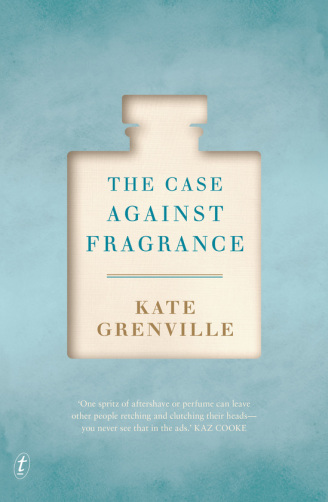
I thoroughly enjoyed Kate Grenville’s Secret River, so when I saw this non-fiction book I thought it would be interesting so see how her style adapted to the form. Interesting it most certainly is. There are times when Grenville belabours a point, reiterating her evidence through explanation or adding more information to the point she is making; but while this annoyed me at times, I understand it too. She feels that people are not, have not been, listening regarding the subject of fragrance. And what she has to say is shocking.
Grenville suffers from the effects of fragrance. She gets headaches and nausea and thought she was imagining it at first. When I have told people that I find the fragrance of Lush or Dusk overwhelming, some agree and others are surprised – they like the fragrance, which pushes into the closed confines of shopping malls like a fog to my senses. Grenville has effectively conducted a meta-study, examining available data and research to compose a damning report on the role of fragrance in the modern world. Many things she says raised question marks in my head. She writes about the prevalence of artificial fragrance in a wide range of products today, as opposed to previous times. Once we cleaned our homes with Gumption and bleach and were glad to have it clean. Now it seems almost impossible to find products that do not have some kind of fragrance, which used together can clash in quite revolting ways – especially where people are also fond of diffusers or oil burners.
Like Grenville, I am not sure when filling ones home with scent became the norm. Clearly this was going on right under my nose [hahaha] without my really noticing. However, what I have noticed, is how many houses I enter where the range of smells is so diverse I feel choked. She has also made me more aware of how I use scent. I have gradually moved away from commercial products in my home in favour of bicarbonate of soda and vinegar [to which I add remnants of citrus]. I have now made up a beeswax and orange oil treatment for the wood, to both feed it and add to the ‘clean’ citrus smell in the house. I have found unscented shampoo and deodorant, and am contemplating not using perfume – I certainly will never again use it in confined spaces like theatres and restaurants.
Most disturbing of all, in my mind, was the information she offers regarding the effects of scents on our hormones. Clearly part of the appeal of fragrance for the majority, is to enhance mood. We like certain scents in our homes and on our person, as they make us feel ‘good’ or better, cheer us up, remind us of happy times – after all, it is quite well known that the sense of smell is one of the most potent triggers of memory. However, research that indicates scent can disrupt hormones, is truly worrying. In a world in which behaviour patterns in children seem to be changing – which has been accredited to all manner of causes, from technology to high rise living [there was a study which examined ADHD prescriptions in the US, which showed diagnosis and use decreased enormously the further away from the East coast you lived] – but, while this could be a product of trying to force children to live in crowded and restricted environments, could it not also be possible that homes in the country tend to use less scent? She raises other questions too: about the effects on gender assignment, asthma and a range of other conditions.
While it can become a touch preachy, rather than merely persuasive, Grenville’s passion and concern are writ large in this tome. Well worth a read, whether you are bothered by fragrance or not.
Advertisements Share this:





